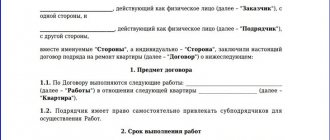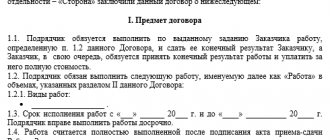Renovating an apartment is not a cheap pleasure. Especially when you hand it over to a construction crew. You have to pay twice: not only for materials, but also for work. Therefore, before allowing builders to carry out repairs, it is worth insuring yourself by concluding a special agreement. However, it will also be very useful for the workers themselves. Let’s figure out what risks this important document will protect you from and how to draw it up correctly.
Why do you need a contract for apartment renovation?
According to the law, an apartment renovation contract is the same as a household contract document (Articles 730 - 739 of the Civil Code of the Russian Federation). It defines the relationship between the customer and the contractor and gives both parties security. All possible disagreements are nipped in the bud. By signing it, the contractor promises to complete the work on time and take into account all the nuances, and the customer promises to pay.
If such an agreement is not concluded, then in the future it is unlikely that you will be able to protect your rights. Each side has enough risks. Moreover, you will have to take into account the interests of your neighbors.
Risks for the customer:
- There is a possibility that the estimate, as if by magic, will increase several times.
- Workers often delay the delivery of a project.
- Unscrupulous contractors can disappear without a trace after receiving an advance payment.
- The repair will be of poor quality.
Risks for the performer:
- The customer will not pay the promised salary.
- You will have to leave the workplace ahead of schedule because the customer demands something that was not agreed upon.
In case of conflict situations, a properly drafted contract will help defend yourself in court.
What law governs the framework agreement?
The framework agreement appeared in 2015 and is regulated by Article 429.1 of the Civil Code.
Before this, a similar agreement was applied, but was called an organizational agreement, which determined the general features of the future full-fledged agreement. The framework is subject to the principles of civil law on freedom of contract, the validity of the contract, and the requirements for the form of concluding the contract. The parties enter into it free of charge, and property obligations will appear in subsequent agreements.
Sample contract for apartment renovation
To legitimize the working relationship between the repair contractor and the customer, it is enough to type “sample apartment renovation agreement” or “sample apartment renovation contract” on the Internet. It is the same. Then print and fill out.
Apartment renovation agreement between individuals , sample
Or you can draw up a document yourself, you don’t even have to go to a lawyer. The main thing is that all the most important points appear in it:
- Participants in the transaction. Here we write down information from the passports of the customer and the contractor. The contractor can be either a company or an individual. In the first case, instead of the full name there will be the name of the company, and the signature is placed by the manager or authorized representative. In the second case, the contract is signed by any person who will do the repairs, for example, a foreman.
- Subject of the agreement. This paragraph includes the names of all the work and where exactly it will be carried out - in an apartment, a house, in one room or just a toilet. The site address is required.
Separately, as support for the item, there is a detailed estimate and technical plan of the apartment. You can get it at the BTI, and apply at the MFC closest to your home. To do this, you will need the apartment owner’s passport and an extract from the Unified State Register of Real Estate.
An extract from the Unified State Register will confirm ownership. It’s also easy to get, you don’t even need to go to the MFC. The opportunity to order a certificate without leaving home is provided by the EGRN.Reestr service . It is very convenient and inexpensive. Applications are accepted both on the website and through the application. The finished statement in a readable format arrives by email within half an hour. It costs 200-300 rubles depending on the type.
- Repair deadlines. Contains the start and end dates of renovations in the apartment. If necessary, we also allocate time for each stage of work. For example, builders are required to install a toilet on a certain day, and within a week to plaster and wallpaper the walls. We also indicate the date of acceptance of the work.
- Penalties. We determine the amount of fines if any of the stages of work is not completed on time.
- Payment for work. We write down the payment details. Here's who will come to an agreement. Whether it will be a full prepayment or only a part, payment upon delivery or for each stage of work separately according to the schedule - it is up to both parties to decide. If the full cost of services is not yet known exactly, you can leave it out for now and add it later.
- Materials. It makes sense to add this clause if the contractor is going to buy the materials himself. Then the customer can indicate what quality they should be, what colors and textures, what company they should be produced by. The more details, the easier it will be to file a claim if something happens.
Contract agreement for repair work
Contract agreement for repair work No.
g.
"" g.
in the person acting on the basis, hereinafter referred to as the “
Customer
”, on the one hand, and in the person acting on the basis, hereinafter referred to as the “
Contractor
”, on the other hand, hereinafter referred to as the “
Parties
”, have concluded this agreement, hereinafter "Agreement" as follows:
SUBJECT OF THE AGREEMENT
1.1. Under this agreement, the Contractor undertakes, within the period established by the agreement, to carry out, on the instructions of the Customer, work on routine repairs of premises with a total area of sq.m., located at the address: (hereinafter referred to as the Facility), and the Customer undertakes to accept the work performed and pay the price stipulated by the Agreement.
1.2. The list and cost of work performed under this Agreement are determined by the Estimate for repair and finishing work (Appendix No. 1), which is an integral part of this Agreement.
1.3. The content and schedule of work are reflected in the Work Schedule (Appendix No. 2), which is an integral part of this Agreement.
1.4. The Contractor, on the instructions of the Customer, purchases the necessary construction and finishing materials for carrying out repair work. The Parties reflect the payment procedure in the Financing Schedule for the purchase of construction and finishing materials (Appendix No. 3), which is an integral part of this agreement. The Contractor, in confirmation of the expenditure of funds for the purchase of construction and finishing materials, provides the Customer with the necessary reporting documentation (checks, receipts, invoices, etc.).
RIGHTS AND OBLIGATIONS OF THE CONTRACTOR
2.1. The Contractor is obliged to begin work within the time limits established in clause 4.1 of this agreement.
2.2. The Contractor undertakes to carry out repair work on time and with high quality using the Customer’s own tools, mechanisms and materials in full compliance with the technical documentation and the Estimate for repair and finishing work (Appendix No. 1).
2.3. The Contractor is responsible for providing the work with materials and equipment, as well as for the safety of materials or other property of the Customer provided by the Customer.
2.4. The Contractor undertakes to agree in advance with the Customer on the materials and equipment that the Contractor intends to use to perform work under this Agreement.
2.5. The Contractor is responsible for the safety of systems and structures of the Facility that are not subject to dismantling and repair.
2.6. The contractor is obliged to transfer, along with the result of the work, information regarding the operation of the facility or its other use.
2.7. The contractor has the right to complete and deliver the work ahead of schedule.
RIGHTS AND OBLIGATIONS OF THE CUSTOMER
3.1. The Customer undertakes to accept and pay for the work performed within the terms and conditions established by this Agreement.
3.2. The Customer has the right to exercise control and supervision over the progress and quality of work performed, compliance with deadlines for their completion, and the quality of materials provided by the Contractor.
3.3. The Customer provides premises for storing construction materials, tools and equipment used by the Contractor during the work and bears financial responsibility for its safety.
3.4. The Customer reserves the right to give instructions as the work progresses and to make such changes as it deems necessary for the successful and economical completion of the work.
3.5. All comments and orders of the Customer, entailing changes in the price and timing of work, are formalized in the Additional Agreement to this Agreement.
TURNAROUND TIME
4.1. The Contractor begins work within working days from the date of receipt of advance funds from the Customer.
4.2. The period for completing the work under this Agreement is business days from the date of commencement of the work provided for in clause 4.1 of this agreement (the initial period for the work is “” of the year, the final period of “” is the year).
CONTRACT PRICE
5.1. For the work performed by the Contractor under this Agreement, the Customer pays in accordance with the Estimate for repair and finishing work (Appendix No. 1) a sum of money in the amount of rubles.
TERM AND PROCEDURE OF PAYMENT
6.1. Advance payments in the amount of % of the total amount specified in clause 5.1 of this agreement are made by the Customer within banking days from the date of signing this agreement.
6.2. For each completed stage of work, the Customer pays the Contractor an amount of money, which is determined by the parties in the Work Schedule (Appendix No. 2) and in the Estimate for repair and finishing work (Appendix No. 1). The amount of money for each stage is paid by the Customer within days after signing the Work Acceptance Certificate for this stage (hereinafter referred to as the Interim Work Acceptance Certificates). Interim work acceptance certificates are an integral part of this Agreement (Appendix No. 4).
6.3. The final payment in the amount of % of the total amount specified in clause 5.1 of this agreement in rubles is made by the Customer after completion of work within banking days from the date of signing the Certificate of Completion of Work (Appendix No. 5), which is an integral part of this Agreement.
WORK ACCEPTANCE PROCEDURE
7.1. The final delivery of the work results and their acceptance are formalized by the Certificate of Completion of Work (Appendix No. 5), which is signed by both parties within working days after completion of the work.
7.2. The customer has the right to refuse to accept the results of the work and to refuse to sign the Certificate of Completion if deficiencies are discovered that exclude the possibility of normal use of the repair object and cannot be subsequently eliminated by available means.
7.3. If the Customer refuses to sign the Certificate of Completion of Work and there are comments on the quality of the work performed, a note is made about this in the Certificate and a reasonable period is assigned for the Contractor to eliminate the deficiencies.
7.4. The risk of accidental loss or accidental damage to the results of work passes to the Customer from the moment the Certificate of Completion is signed.
7.5. In the event of an unreasonable refusal to sign the Certificate of Work Completion on the part of the Customer, the Contractor signs the Certificate of Completion of Work unilaterally, and in this case the work is considered completed and claims regarding the quality of the work performed will not be accepted.
QUALITY OF WORK PERFORMED
8.1. The Contractor guarantees that the repair facility will achieve the indicators specified in the technical documentation, that it will comply with the building codes and regulations binding on the parties, and that it will be able to operate the facility for one year.
8.2. The Contractor is responsible for all defects discovered within the warranty period, unless he proves that they arose as a result of improper operation by the Customer, improper repair of the facility carried out by the Customer himself, or third parties involved by him.
RESPONSIBILITY OF THE PARTIES
9.1. In cases where the work was performed by the Contractor with a deviation from the terms of this Agreement, which worsened the result of the work, or with other shortcomings that make it unsuitable for normal use, the Customer has the right to demand that the defects be eliminated free of charge within calendar days.
9.2. If the Contractor violates the terms of the contract for reasons not specified in this Agreement, the Customer has the right to withhold from the amount payable a penalty in the amount of % for each day of delay from the amount of the Contract, but not more than %.
9.3. In case of untimely payment by the Customer for the cost of work under this Agreement, the Contractor has the right to demand from the Customer payment of a penalty in the amount of % for each day of delay in payment of the amount of the Agreement, but not more than %.
9.4. Payment of the penalty does not relieve the Parties from liability under this Agreement.
FORCE MAJEURE
10.1. The parties are released from liability in cases of force majeure circumstances.
10.2. Force majeure circumstances mean external and extraordinary events that did not exist at the time of signing the Agreement and arose against the will of the parties, the occurrence and action of which the parties could not prevent with the help of such measures and means, the use of which in a specific situation is fair to demand and expect from the party subjected to force majeure.
10.3. Force majeure is recognized as natural disasters and the following events: war and hostilities, epidemics, fire, issuance of an act by a public authority or management body, as a result of which the fulfillment of an obligation becomes impossible or economically unfeasible, as well as other events and circumstances that the competent authorities recognize and declare cases of force majeure.
10.4. A party for which the fulfillment of obligations under this Agreement has become impossible due to the occurrence of force majeure circumstances is obliged to notify the other party in writing (by registered mail, telegram) within one day, indicating and confirming the specific reasons why the fulfillment of obligations seems impossible.
10.5. The occurrence of force majeure circumstances provided for in this Agreement extends the performance period for a period corresponding to the duration of these circumstances and a reasonable period for eliminating these consequences.
10.6. If the force majeure circumstances provided for in this Agreement last more than months, the parties must agree on the fate of this Agreement. In the event that the parties do not come to an agreement, the party that is not affected by force majeure has the right to terminate the Agreement without applying to the arbitration court, on the basis of written notification of this (by registered mail, telegram) to the other party.
OTHER CONDITIONS
11.1. This Agreement comes into force from the moment it is signed by the Parties and is valid until the Parties finally fulfill their obligations under this Agreement.
11.2. This agreement has been drawn up in two copies having equal legal force, one for each of the parties.
11.3. All disputes that may arise from this Agreement or in connection with it are preliminarily resolved by the Parties through negotiations. If an agreement between the parties is not reached, the dispute will be subject to consideration in the courts of the city.
11.4. In case of non-compliance with the payment schedule by the Customer, the Contractor has the right to unilaterally terminate this agreement or extend the final deadline for completing the work.
WARRANTY FOR WORK COMPLETED
12.1. The Contractor guarantees the proper performance of work under this Agreement in accordance with the current rules, regulations and conditions of this Agreement. The warranty period is months from the date of signing the Certificate of Completion by both parties.
12.2. If deficiencies are identified before the expiration of the warranty period, the Customer informs the Contractor about this and approves the deadline for eliminating the deficiencies.
12.3. The fact that deficiencies have been eliminated is confirmed during a special acceptance by the Customer’s representative.
LEGAL ADDRESSES AND BANK DETAILS OF THE PARTIES
Customer
- Legal address:
- Mailing address:
- Phone fax:
- INN/KPP:
- Checking account:
- Bank:
- Correspondent account:
- BIC:
- Signature:
Contractor
- Legal address:
- Mailing address:
- Phone fax:
- INN/KPP:
- Checking account:
- Bank:
- Correspondent account:
- BIC:
- Signature:
What are the requirements for a framework agreement?
The Civil Code of the Russian Federation contains only general requirements for a framework agreement. The parties have the right to determine all the rules and conditions in the document themselves. An agreement falls under the concept of a framework agreement if it specifies the general outlines of the agreement: it may not contain the names of goods or services or the amount of the agreement. In the future, the general conditions are subject to clarification and reinforcement using annexes to the contract (specifications); the parties sign them when the need for supply arises. The amount of such an agreement is the sum of all applications.
But do not confuse a framework agreement with a preliminary agreement. Under a preliminary agreement, the parties are obligated to sign an agreement in the future on the terms and conditions specified in the preliminary agreement. And if a framework agreement is concluded, in the future the parties only clarify the specific conditions using appendices to the agreement.
Rule 2. Do not enter into an agreement for an indefinite period
Set a completion date for the work in the contract. If the contract provides for stages, you can set deadlines for the completion of the stages.
The constant or systematic nature of the work may indicate that what is important to the parties is not the result of the work, but the process of its implementation. What characterizes labor relations? Therefore, do not write in the contract with a self-employed person that “the contract is concluded for an indefinite period.”
The term is one of the most important terms of a contract. If it is not agreed upon, the contract cannot be considered concluded.
In addition, after the expiration of construction contracts, it is also not worth systematically re-signing them.
Although the Federal Tax Service agrees that the law has no restrictions on the terms of cooperation of one self-employed person with the same customer, nevertheless, repeated re-conclusion of a civil contract may indicate the presence of signs of an employment relationship (letter of the Federal Tax Service dated April 1, 2021 No. AB-4- 20/ [email protected] ).
How to draw up a framework agreement
Include as many important things as possible in the frame. To avoid problems, formulate in the framework agreement the important conditions that were agreed upon: sanctions for failure to deliver and failure to meet deadlines, acceptance rules, methods of determining the price, the right to unilaterally withdraw from the contract, the procedure for filing claims. Then, in the annex to the contract, it remains to specify the specifics: assortment items, number of deliveries and their terms, payment terms, prices.
Ensure cooperation. The framework does not guarantee the conclusion of applications. And if the counterparty refuses to cooperate, he cannot be forced to do so, as is the case with a preliminary agreement.
To avoid such situations, negotiate the framework agreement carefully. For example, include a clause that the supplier must accept all bids from the buyer within certain amounts. Or, conversely, the buyer undertakes to accept all goods of proper quality from the supplier.
Don't forget about apps. Carefully draw up annexes to the contract. Often the parties carefully agree on the terms of the framework agreement, but during the next delivery they forget to draw up a specification, which in essence becomes the main agreement. And then, in case of violations by one of the parties, there will simply be no basis to hold it accountable.
Flaws in the design of the framework and applications can also lead to difficulties.
Establish a connection between the framework and the applications. Write in the frame the name of the documents in which you and the other party will establish the missing terms of the contract: application, specification, application, supply agreement. Please note: some documents require signatures of two parties (supply agreement), while some remain one-sided (application, offer). When drawing up specific documents, make sure that the name strictly corresponds to that specified in the framework agreement, and also state in each application that it forms part of the framework agreement.
Rule 3. Do not set monthly payment for work in a fixed amount
In a work contract, what is important is not the process of performing the work, but the result of the work, the transfer of which leads to the payment of remuneration. The remuneration should not be paid in the same amount and monthly .
Under a contract, the process of delivery of work is important : a report from the contractor on the readiness of the entire scope of work or part of it, verification by the contractor of the quality of the work performed, acceptance of the finished result. Only after this the customer can pay the self-employed remuneration. It is desirable that the amount of remuneration under the contract depend on the volume and nature of the work performed.
Therefore, it is impossible to indicate in a contract with a self-employed person: “a monthly remuneration of 10 thousand rubles is established for the contractor.” Such a reflection of a fixed and regular remuneration will lead inspectors to the conclusion that this is an employment contract.
What happens when the framework is terminated
The contract ceases to be valid if there is a refusal to renew it or upon termination - and then rely on the rules for termination of the Civil Code of the Russian Federation.
Termination of the framework does not relieve the parties of existing obligations under transactions that are enshrined in the annexes to the framework. The main framework agreement and the specifications for it are independent contracts, so termination of the framework does not entail termination of the specifications, but only releases the parties from the obligation to enter into future transactions on the terms of the framework and with reference to it.
Record agreements, keep records and submit reports in the Kontur.Accounting web service. The service will save you from routine: most operations are automated. You will never forget to pay taxes on time, easily pay salaries to employees and generate reports in a few clicks. All newcomers work in the service for free for the first 14 days.








